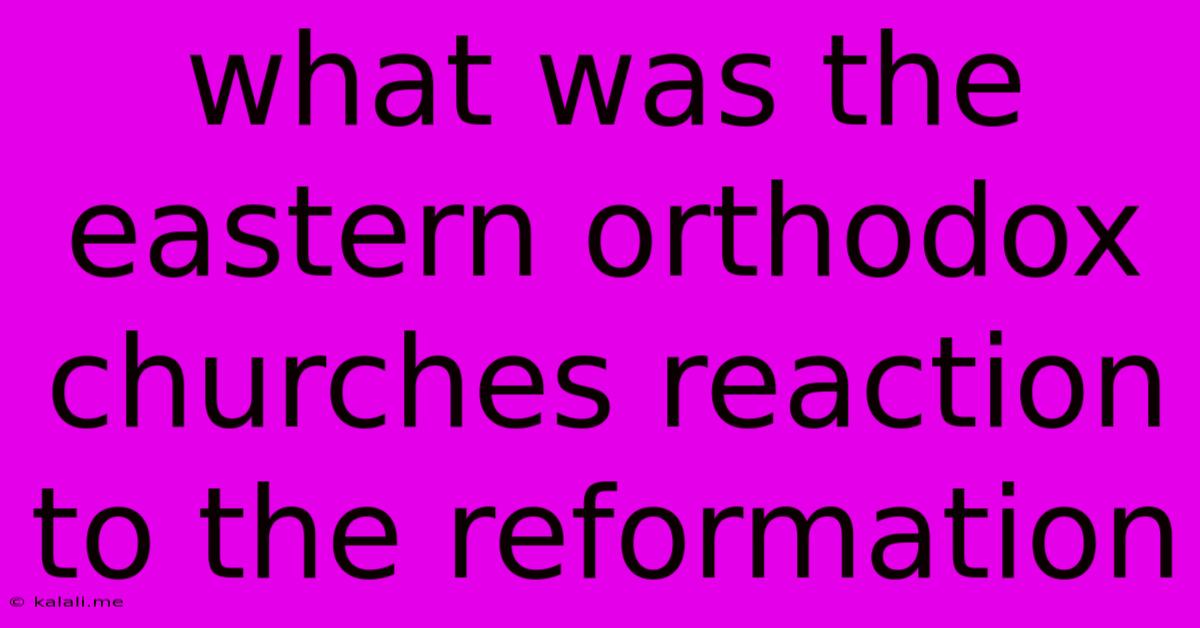What Was The Eastern Orthodox Churches Reaction To The Reformation
Kalali
Jun 08, 2025 · 3 min read

Table of Contents
The Eastern Orthodox Church and the Reformation: A Response of Distancing and Dialogue
The Protestant Reformation, ignited by Martin Luther's Ninety-Five Theses in 1517, sent seismic waves across the religious landscape of Europe. While the Roman Catholic Church bore the brunt of the upheaval, the Eastern Orthodox Church, already separated from Rome for centuries, also observed and reacted to these dramatic changes. Their response was multifaceted, characterized by a mixture of distancing, cautious observation, and, in some instances, limited engagement. This article will explore the nuanced reaction of the Eastern Orthodox Church to the Reformation, examining its theological objections, political considerations, and the long-term implications of this historical interaction.
Theological Objections: A Different Path to Understanding Christianity
The Eastern Orthodox Church viewed the Reformation through a lens shaped by its distinct theological framework. Several key points of divergence fueled their opposition:
-
Sola Scriptura: Luther's emphasis on sola scriptura (Scripture alone) as the ultimate authority clashed fundamentally with the Orthodox understanding of tradition. Orthodox theology places significant weight on Sacred Tradition, encompassing patristic writings, liturgical practices, and conciliar decisions, alongside Scripture. They saw the Protestant rejection of Tradition as a potential path to theological fragmentation and instability.
-
The Nature of the Sacraments: The Protestant rejection of certain sacraments, particularly the Eucharist, was another point of contention. The Orthodox Church maintains a robust understanding of seven sacraments, viewing them as outward signs of inward grace. The Protestant reduction of sacraments challenged this fundamental aspect of Orthodox sacramental theology.
-
Authority and the Papacy: While already independent of Rome, the Orthodox Church viewed the Reformation's challenges to papal authority as a symptom of deeper issues concerning ecclesial structure and authority. They observed the ensuing religious conflicts and fragmentation as evidence of the dangers of unchecked individualism in religious interpretation.
-
Christology and Soteriology: Subtle but significant differences in Christology (the study of Christ) and soteriology (the study of salvation) further distinguished the Orthodox from the Reformers. The Orthodox emphasis on theosis (divinization) – the process of becoming like God through communion with Christ – contrasted with some Protestant interpretations of salvation.
Political Considerations: Navigating Shifting Power Dynamics
The political landscape of the time significantly influenced the Orthodox response. The Reformation coincided with periods of Ottoman expansion, presenting significant geopolitical challenges for Eastern Orthodox communities. Focusing inward on preserving their own cultural and religious identities often took precedence over engaging deeply with the theological debates unfolding in Western Europe.
-
Internal Challenges and Consolidation: The Eastern Orthodox Church was dealing with its own internal challenges, including the need for reform and consolidation within its various Patriarchates. This internal focus naturally diverted attention and resources away from actively engaging the Reformation.
-
Limited Interaction: Geographical distance and limited communication channels also played a role in the relatively restrained engagement. Direct interaction between Orthodox and Protestant theologians was less frequent than between Catholics and Protestants.
Long-Term Implications: A Distance Maintained, Yet With Potential for Dialogue
The Reformation ultimately resulted in a continued distancing between the Orthodox and Protestant traditions. Despite occasional attempts at dialogue over the centuries, significant theological differences remained. However, the historical context should not overshadow the potential for future ecumenical endeavors.
-
Modern Ecumenical Efforts: In modern times, there have been growing efforts towards ecumenical dialogue between Orthodox and Protestant churches, focusing on areas of shared theological ground, especially in areas of social justice and moral responsibility.
-
Mutual Understanding: A deeper understanding of each other’s historical contexts and theological traditions is crucial for fostering meaningful engagement in the future. This includes acknowledging the common Christian heritage shared, alongside recognizing differences stemming from unique historical paths and theological frameworks.
In conclusion, the Eastern Orthodox Church’s reaction to the Reformation was a complex interplay of theological convictions, political circumstances, and geographical distance. While initially characterized by a cautious detachment, the potential for future constructive dialogue and ecumenical understanding remains a vital aspect of contemporary inter-Christian relations.
Latest Posts
Latest Posts
-
How Does Light Go From Red To Viowelt
Jun 08, 2025
-
How To Reheat A Casserole In The Oven
Jun 08, 2025
-
There Already An Object Named In The Database
Jun 08, 2025
-
Conjugate Of A Complex Number In Polar Form
Jun 08, 2025
-
Digital Circuits Are Made From Analog Parts
Jun 08, 2025
Related Post
Thank you for visiting our website which covers about What Was The Eastern Orthodox Churches Reaction To The Reformation . We hope the information provided has been useful to you. Feel free to contact us if you have any questions or need further assistance. See you next time and don't miss to bookmark.